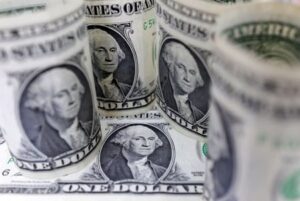By Trevor Hunnicutt, Jeff Mason and David Shepardson
WASHINGTON/SAN FRANCISCO (Reuters) -U.S. President Joe Biden is set to announce new China tariffs as soon as next week targeting strategic sectors, including a major hike in levies on electric vehicles (EVs), according to three people familiar with the matter.
The full announcement, expected Tuesday, will maintain existing tariffs on many Chinese goods set by former President Donald Trump, according to one of the people.
But it will also add new tariffs to semiconductors and solar equipment, according to one of the people, as well as hiking EV tariffs. Chinese-made medical supplies like syringes and personal protective equipment also face additional tariffs, sources told Reuters.
In revising the so-called “Section 301 tariffs,” the Biden administration has zeroed in on industries that it says are of strategic competitive and national security areas, one of the people said.
The long-awaited tariff update comes after a number of lawmakers have called for massive hikes on Chinese vehicle tariffs. There are relatively few Chinese-made light duty vehicles being imported now.
Tariffs on Chinese EVs will roughly quadruple under the new Biden plan, the Wall Street Journal reported, citing people familiar with the matter. Senate Banking Committee Chairman Sherrod Brown wants the Biden administration to ban Chinese EVs outright, over concerns they pose risks to Americans’ personal data.
The U.S. Trade Representative’s office made its recommendations to the White House weeks ago but a final announcement has been delayed due to internal discussions, sources said. It may come later than Tuesday, some sources said.
Biden, a Democrat seeking re-election in November, is looking to contrast his approach with that of Republican candidate Trump, who has proposed across-the-board tariffs that White House officials see as too blunt and prone to spark inflation. Trump has promised 60% or higher tariffs on all Chinese goods.
The White House and the office of the U.S. Trade Representative declined to comment.
The measures could invite retaliation from China at a time of heightened tensions between the world’s two biggest economies. Trump’s broader imposition of tariffs during his 2017-2021 presidency kicked off a tariff war with China.
Both 2024 candidates have sharply departed from the free-trade consensus that once reigned in Washington, a period capped by China’s joining the World Trade Organization in 2001.
In 2022, Biden launched a review of the Trump-era policy under Section 301 of the U.S. trade law. Last month, he called for sharply higher U.S. tariffs on Chinese metal products but the targeted products were narrow in range, estimated at more than $1 billion of steel and aluminum products, a U.S. official said.
Biden also announced launching an investigation into Chinese trade practices across the shipbuilding, maritime and logistics sectors, a process that could lead to more tariffs.
The Biden administration has also been pressuring neighboring Mexico to prohibit China from selling its metal products to the United States indirectly from there.
China has said the tariff measures are counter-productive and inflict harm on the U.S. and global economy.
(Additional reporting by Andrea Shalal and Kanjyik Ghosh; Editing by Edwina Gibbs, Sonali Paul, Heather Timmons and Alistair Bell)





